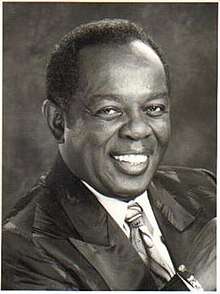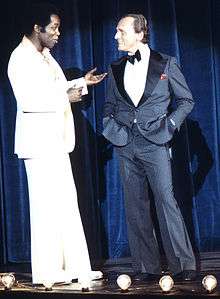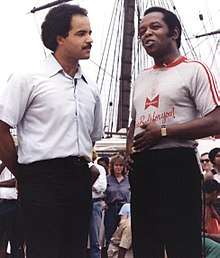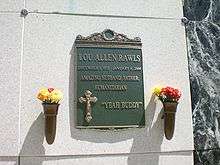Lou Rawls
| Lou Rawls | |
|---|---|
 Rawls in 1995 | |
| Background information | |
| Birth name | Louis Allen Rawls |
| Born |
December 1, 1933 Chicago, Illinois, U.S. |
| Died |
January 6, 2006 (aged 72) Los Angeles, California |
| Genres | Gospel, R&B, soul, jazz, blues |
| Occupation(s) | Singer, songwriter, actor, voice actor |
| Instruments | Vocals |
| Years active | 1951–2005 |
| Labels | Capitol |
| Website |
www |
Louis Allen Rawls (December 1, 1933 – January 6, 2006) was an American singer, songwriter, actor, voice actor, and record producer.[1] Rawls released more than 60 albums, sold more than 40 million records,[2] and had numerous charting singles, most notably his song "You'll Never Find Another Love Like Mine". He worked as a film, television, and voice actor. He was also a three-time Grammy-winner, all for Best Male R&B Vocal Performance.
Early years
Rawls was born in Chicago on December 1, 1933, and raised by his grandmother in the Ida B. Wells projects on the city's South Side. He began singing in the Greater Mount Olive Baptist Church choir at the age of seven and later sang with local groups through which he met Sam Cooke, who was nearly three years older, and Curtis Mayfield.[3][4]
Career
After graduating from Dunbar Vocational High School, he sang briefly with Cooke in the Teenage Kings of Harmony, a gospel group, and then with the Holy Wonders. In 1951, he replaced Cooke in the Highway QC's after Cooke departed to join The Soul Stirrers in Los Angeles. Rawls was hired by the Chosen Gospel Singers and moved to Los Angeles, where he joined the Pilgrim Travelers.
In 1955, Rawls enlisted in the United States Army as a paratrooper in the 82nd Airborne Division. He left the All-Americans three years later as a sergeant and rejoined the Pilgrim Travelers (then known as the Travelers). In 1958, while touring the South with the Travelers and Sam Cooke, Rawls was in a car crash. He was pronounced dead before arriving at the hospital, where he stayed in a coma for five and a half days. He spent a year recuperating and several months before his memory return. He considered the crash a life-changing event.
With Dick Clark as master of ceremonies, Rawls was able to perform at the Hollywood Bowl in 1959. His first two singles were "Love, Love, Love" and "Walkin' (For Miles)" for Shar-Dee Records, a label owned by Herb Alpert. "In My Little Black Book" and "80 Ways" were released a year later by Candix Records. In 1962 he signed a contract with Capitol Records and sang backing vocals on "Bring It On Home to Me" and "That's Where It's At", both written by Cooke. [5] Rawls charted with a cover of "Bring It On Home to Me" in 1970 (with the title shortened to "Bring It On Home").
Lou Rawls, 1968 Pop Chronicles interview[6]
Stormy Monday, a jazz album with Les McCann, was released in 1962. The next two Capitol albums (Black and Blue, Tobacco Road) sold well and employed Onzy Matthews as musical director and a 17-piece big band. Both albums reached the Billboard magazine charts and propelled his career.
Alhough his 1966 album Live! was certified gold, Rawls would not have a star-making hit until he made a soul album, named Soulin' , later that same year. The album contained "Love Is a Hurtin' Thing". his first R&B No.1 single. In 1967 he won a Grammy Award for Best R&B Vocal Performance for the single "Dead End Street." In 1967, he performed at the first evening of the Monterey International Pop Music Festival.[7]

In 1969, Rawls was co-host of NBC's summer replacement series for the Dean Martin Show with Martin's daughter, singer Gail Martin. After leaving Capitol in 1971, he signed with MGM and released the single "Natural Man" written for him by comedian Sandy Baron and singer Bobby Hebb. For Bell Records in 1974 he recorded a cover version of "She's Gone" by Hall & Oates. Two years later he signed with Philadelphia International and recorded All Things in Time, which sold a million copies. "You'll Never Find Another Love Like Mine" became his biggest selling single, selling a million copies, topping the R&B and Adult Contemporary charts, and reaching No. 2 on the pop chart. The hit single "Lady Love" followed, from the album When You Hear Lou, You've Heard It All.
Charity

In 1980, Rawls began the Lou Rawls Parade of Stars Telethon which benefits the United Negro College Fund. The annual event, known since 1998 as "An Evening of Stars: A Celebration of Educational Excellence", consists of stories of successful African-American students who have benefited from and/or graduated from one of the many historically black colleges and universities who receive support from the UNCF, along with musical performances from various recording artists in support of the UNCF's and Rawls' efforts.[8] The event has raised over US$200 million in 27 shows for the fund through 2006.
Television and film career
Rawls appeared in a segment aired during the first season of Sesame Street to sing the alphabet. He dismissed the concept of using cue cards for the performance but reversed that decision when he forgot the order of the letters.[9] He was a guest during the second season of The Muppet Show.[10]
His first acting credit was in the western television series The Big Valley (starring Barbara Stanwyck, along with Lee Majors and Linda Evans). He appeared in the films Leaving Las Vegas, Blues Brothers 2000, and Angel, Angel, Down We Go. He had a role and sang in Lookin' Italian, an independent film about the mafia. He had a supporting role in Baywatch Nights. He was a guest host on Jazz Central, a television program that was broadcast on the BET channel.
For many years, he was a spokesperson for the Colonial Penn Life Insurance Company. First appearing in television and radio commercials in the mid-to-late 1960s for Spur Malt Liquor, a Rainier Brewing Company product in Seattle.[11] He appeared in a number of Budweiser advertisements. Budweiser was a sponsor for the Rawls telethon and UNCF. There was no attempt to avoid the similarity between the title of the 1977 album When You've Heard Lou, You've Heard It All and his corporate sponsor's slogan "When You Say Bud, You've Said It All". A track on the 1978 album Lou Rawls Live features has him singing the commercial slogan. Anheuser-Busch, the brewers of Budweiser, suggested his telethon work to him.
Rawls lent his rich baritone to cartoons, including Hey Arnold!, Garfield, Captain Planet and the Planeteers and The Proud Family. For many of the Film Roman Garfield specials, Rawls would often compose songs, which he would then sing usually doing a duet with Desiree Goyette, as well as the singing voice of the title character himself.
Awards and honors
On the night of September 29, 1977, Rawls performed the national anthem of the United States before the Earnie Shavers-Muhammad Ali title fight at Madison Square Garden. He was invited to sing the anthem many times over the next 28 years. His final performance was in his hometown of Chicago when he was asked to sing the national anthem before Game Two of the 2005 World Series between the Chicago White Sox and Houston Astros at U.S. Cellular Field.
In 1982, Rawls received a star on the Hollywood Walk of Fame. On January 19, 1985, he sang "Wind Beneath My Wings" at the nationally-televised 50th Presidential Inaugural Gala the day before the second inauguration of Ronald Reagan.
Guion Bluford, the first African-American astronaut,[12] brought the Lou Rawls album When the Night Comes (Epic, 1983) into space with him. It contained the song "Wind Beneath My Wings".[13] In 1989, he performed vocals for "The Music and Heroes of America" segment in the animated television miniseries This is America, Charlie Brown.
In January 2004, Rawls was honored by the United Negro College Fund for his more than 25 years of charity work with the organization. Instead of hosting and performing as he usually did, Rawls was given the seat of honor and celebrated by his performing colleagues, including Stevie Wonder, The O'Jays, Gerald Levert, and Ashanti. His final television performance occurred during the 2005–2006 edition of the telethon, honoring Stevie Wonder in September 2005 months before entering the hospital and after having been diagnosed with cancer earlier in the year. He performed "You Are the Sunshine of My Life" and "It Was A Very Good Year" as a tribute to Frank Sinatra.
Personal life

Rawls's first marriage was in the spring of 1968, in Princeton NJ. Sidney Poitier was his best man, and the reception was held at Westminster Choir College.
In 2003 Rawls married Nina Inman. On December 19, 2005, the Associated Press reported that Rawls tried to annul his two-year marriage to Inman, who had been acting as his business manager, after it was discovered she had made unauthorized transfers amounting to nearly $350,000 from his bank account into an account solely controlled by Andrew Baijnath. She later stated that she had transferred the funds to protect them from one of Rawls' daughters from a previous relationship.
In December 2005, it was announced that Rawls was being treated for lung cancer that spread to his brain. With his wife of two years by his side, Lou Rawls died from his illness on January 6, 2006, at Cedars-Sinai Medical Center in Los Angeles, California.[14]
Rawls had one son with Inman, Aiden Allen Rawls. He also fathered two daughters: Louanna Rawls, a wardrobe stylist and future Launch My Line contestant, and Kendra Smith, as well as a prior son, Lou Rawls, Jr.
In 2009, Pathway Entertainment announced its intention to produce a biopic about Rawls's life, tentatively titled Love Is a Hurtin' Thing: The Lou Rawls Story.[15], with Rawls' son, Lou Rawls, Jr., writing the screenplay[15] and Isaiah Washington reportedly playing Rawls.[15]
Discography
- 1962 Stormy Monday (Capitol; Blue Note)
- 1962 The Soul-Stirring Gospel Sounds of the Pilgrim Travelers (Capitol)
- 1963 Black and Blue (Capitol)
- 1964 Tobacco Road (Capitol)
- 1965 Nobody But Lou (Capitol)
- 1965 Lou Rawls and Strings (Capitol)
- 1966 Lou Rawls Live! (Capitol)
- 1966 Soulin ' (Capitol)
- 1966 Carryin' On! (Capitol)
- 1967 Too Much! (Capitol)
- 1967 That's Lou (Capitol)
- 1967 Merry Christmas Ho! Ho! Ho! (Capitol)
- 1968 Feelin' Good (Capitol)
- 1968 You're Good for Me (Capitol)
- 1968 The Best Of Lou Rawls (Capitol)
- 1969 The Way It Was, The Way It Is (Capitol)
- 1969 Close-Up (Capitol)
- 1969 Your Good Thing (Capitol)
- 1970 You've Made Me So Very Happy (Capitol)
- 1970 Bring It On Home...And Other Great Sam Cooke Hits (Capitol)
- 1971 Down Here on the Ground/I'd Rather Drink Muddy Water (Capitol)
- 1971 Natural Man (MGM)
- 1972 Silk & Soul (MGM)
- 1972 A Man of Value (MGM)
- 1973 Live at the Century Plaza (MGM; Rebound/Polygram)
- 1974 She's Gone (Bell)
- 1976 Naturally (Polydor)
- 1976 All Things in Time (Philadelphia International)
- 1977 Unmistakably Lou (Philadelphia International)
- 1977 When You Hear Lou, You've Heard It All (Philadelphia International)
- 1978 Lou Rawls Live (Philadelphia International)
- 1979 Let Me Be Good to You (Philadelphia International)
- 1979 In Concert: Recorded with the Edmonton Symphony Orchestra (DEP Entertainment)
- 1979 Sit Down and Talk to Me (Philadelphia International)
- 1980 Shades of Blue (Philadelphia International)
- 1982 Now Is the Time (Epic)
- 1983 When the Night Comes (Epic)
- 1984 Close Company (Epic)
- 1986 Love All Your Blues Away (Epic)
- 1987 Family Reunion (Gamble-Huff)
- 1989 At Last (Blue Note)
- 1990 It's Supposed to Be Fun (Blue Note)
- 1992 Portrait of the Blues (Manhattan)
- 1993 Christmas Is the Time (Manhattan)
- 1998 Seasons 4 U (Rawls & Brokaw)
- 2001 I'm Blessed (Malaco)
- 2002 Oh Happy Day (601 Music/Malaco)
- 2003 Rawls Sings Sinatra (Savoy Jazz)
Billboard Top 50 hit singles
The following is a list of Rawls singles that made the top 50 on the Billboard Hot 100. His first Hot 100 entry was "Three O'Clock in the Morning" in 1965, and his final was "Wind Beneath My Wings" in 1983. In addition to those two, nine other singles peaked at positions below the top 50 on the Hot 100, and additional singles reached the R&B, Adult Contemporary and Bubbling Under charts.
- "Love Is a Hurtin' Thing" - 1966, No. 13 (also No. 1 R&B)
- "Dead End Street" - 1967, No. 29
- "Show Business" - 1967, No. 45
- "Your Good Thing (Is About to End)" - 1969, No. 18 (sold over one million copies and was awarded a gold disc)[17]* "A Natural Man" - 1971, No. 17
- "You'll Never Find Another Love Like Mine" - 1976, No. 2 (also No. 1 R&B and No. 1 Easy Listening); certified gold for sales of one million copies
- "Lady Love" - 1978, No. 24
Chart singles
| Year | Single | Chart Positions | |||
|---|---|---|---|---|---|
| US Pop[18] | US R&B[19] |
US AC | UK[20] | ||
| 1965 | "Three O'Clock in the Morning" | 83 | - | 27 | - |
| 1966 | "The Shadow of Your Smile" | - | 33 | - | - |
| "Love Is a Hurtin' Thing" | 13 | 1 | - | - | |
| "You Can Bring Me All Your Heartaches" | 55 | 35 | - | - | |
| 1967 | "Trouble Down Here Below" | 92 | - | - | - |
| "Dead End Street" | 29 | 3 | - | - | |
| "Show Business" | 45 | 25 | - | - | |
| "Little Drummer Boy" | - | - | - | - | |
| 1968 | "Down Here on the Ground" | 69 | - | - | - |
| 1969 | "Your Good Thing (Is About to End)" | 18 | 3 | 35 | - |
| "I Can't Make It Alone" | 63 | 33 | - | - | |
| 1970 | "You've Made Me So Very Happy" | 95 | 32 | 31 | - |
| "Bring It On Home" | 96 | 45 | - | - | |
| 1971 | "A Natural Man" | 17 | 17 | 14 | - |
| 1972 | "His Song Shall Be Sung" | - | 44 | - | - |
| "Walk On In" | - | - | 34 | - | |
| 1974 | "She's Gone" | - | 81 | - | - |
| 1976 | "You'll Never Find Another Love Like Mine" | 2 | 1 | 1 | 10 |
| "Groovy People" / "This Song Will Last Forever" |
64 - |
19 74 |
19 | - - | |
| 1977 | "See You When I Git There" | 66 | 8 | - | - |
| 1978 | "Lady Love" | 24 | 21 | 5 | - |
| "One Life to Live" | - | 32 | 10 | - | |
| "There Will Be Love" | - | 76 | 33 | - | |
| 1979 | "Let Me Be Good to You" | - | 11 | - | - |
| "Sit Down and Talk to Me" | - | 26 | - | - | |
| 1980 | "You're My Blessing" | 77 | - | - | - |
| "Ain't That Loving You (For More Reasons Than One)" | - | 57 | - | - | |
| "I Go Crazy" | - | 37 | - | - | |
| 1982 | "Will You Kiss Me One More Time" | - | 54 | - | - |
| 1983 | "Wind Beneath My Wings" | 65 | 60 | 10 | - |
| 1984 | "All Time Lover" | - | 67 | - | - |
| 1985 | "Learn to Love Again" | - | 71 | - | - |
| 1987 | "I Wish You Belonged to Me" | - | 28 | - | - |
Filmography
- 1996 Leaving Las Vegas as Concerned Cab Driver
- 2000 Jazz Channel Presents Lou Rawls (Image)
- 2003 In Concert (BMG/Image)
- 2005 Prime Concerts: In Concert with Edmonton Symphony (Amalgamated)
- 2006 The Lou Rawls Show: With Duke Ellington & Freda Payne
- 2007 Live in Concert: North Sea Jazz. 1992-1995 (E-M-S)
See also

References
- ↑ "Find a Performance". Kennedy Center. Archived from the original on November 29, 2005. Retrieved April 28, 2011.
- ↑ "Lou Rawls Battling Cancer", Billboard, December 16, 2005.
- ↑ "Lou Rawls Biography". Biography.com. Retrieved 18 February 2015.
- ↑ Guralnick, Peter (2005). Dream Boogie: The Triumph of Sam Cooke. Little, Brown and Company. p. 37. ISBN 0-316-37794-5.
- ↑ Guralnick 2005, pp. 392,405.
- ↑ Gilliland, John (1969). "Show 52 - The Soul Reformation: Phase three, soul music at the summit. [Part 8] : UNT Digital Library" (audio). Pop Chronicles. University of North Texas Libraries.
- ↑ Gilliland, John (1969). "Show 47 - Sergeant Pepper at the Summit: The very best of a very good year. [Part 3] : UNT Digital Library" (audio). Pop Chronicles. Digital.library.unt.edu. Retrieved April 28, 2011.
- ↑ McLellan, Dennis (January 7, 2006). "Lou Rawls, 72; Grammy-Winning Singer With a Voice Like Velvet". Los Angeles Times.
- ↑ Sesame Street Old School: Volume 1 DVD booklet. In 1969 Rawls appeared on the TV show The Big Valley in the episode "Joshua Watson".
- ↑ Garlen, Jennifer C.; Graham, Anissa M. (2009). Kermit Culture: Critical Perspectives on Jim Henson's Muppets. McFarland & Company. p. 218. ISBN 078644259X.
- ↑ Billboard Magazine, December 17, 1966, p. 45.
- ↑ Administrator, NASA Content (2 March 2015). "Guy Bluford Remembered 30 Years Later". Nasa.gov. Retrieved 27 October 2017.
- ↑ "Toledo Blade - Google News Archive Search". News.google.com. Retrieved 27 October 2017.
- ↑ Ratliff, Ben (January 6, 2006). "Lou Rawls, Suave Singer and Actor, Is Dead at 72". The New York Times.
- 1 2 3 "Lou Rawls biopic in the works", ABC News, March 26, 2009.
- ↑ "Lou Rawls - Biography & History - AllMusic". AllMusic. Retrieved 27 October 2017.
- ↑ Murrells, Joseph (1978). The Book of Golden Discs (2nd ed.). London: Barrie and Jenkins Ltd. pp. 265–266. ISBN 0-214-20512-6.
- ↑ Whitburn, Joel (2003). Top Pop Singles 1955-2002 (1st ed.). Menomonee Falls, Wisconsin: Record Research Inc. p. 578. ISBN 0-89820-155-1.
- ↑ Whitburn, Joel (1996). Top R&B/Hip-Hop Singles: 1942-1995. Record Research. p. 364.
- ↑ Betts, Graham (2004). Complete UK Hit Singles 1952-2004 (1st ed.). London: Collins. p. 633. ISBN 0-00-717931-6.
External links
| Wikimedia Commons has media related to Lou Rawls. |
- Lou Rawls discography at Discogs
- Lou Rawls on IMDb
- All Together - Navy recruiting video ("Tell 'em Lou Rawls sent ya")
- Lou Rawls interviewed on the Pop Chronicles (1969)
- Lou Rawls at Find a Grave